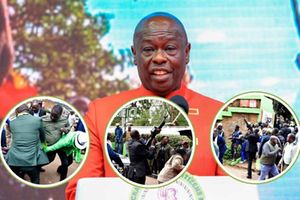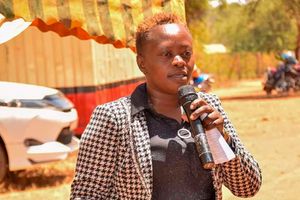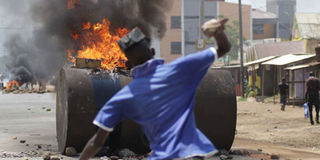
Hired thugs, often organised into hierarchical 'cells' such as Nairobi's 'Dubai' or Kisumu's 'Sangwenya', are a pervasive force in Kenyan politics.
Perchance, you have seen, heard, or heard of them. They are loud, chaotic, swift, and unmistakably violent. Moving with aplomb at the beck and call of their political masters, they are ready to maim, injure, beat, and rob without remorse.
These are the hired goons, paid to disrupt rallies and protests, crush dissent, and sow fear in the name of political dominance.
Meet Joseph Juma (not his real name), a grassroots youth mobiliser based in Makadara, an estate located along the busy Jogoo Road in Nairobi’s Eastlands. He is a member of a group ominously known as “Dubai”, which began as a football club but soon morphed into a cell. He speaks in confidence, and on condition of anonymity, for fear of backlash.

A protesting youth holds a spent bullet cartridge as he shouts during an anti-government protest at Shabab Estate in Nakuru City on July 12, 2023.
The group now boasts dozens of young members, some as young as six, working under a clear, hierarchical leadership. Owning a motorbike is an asset, providing mobility for rallies, football matches, or confrontations even on short notice.
With a glint of pride, Juma recounted how his group helped welcome President William Ruto to Safaricom Grounds in Makadara on March 14, 2025.
“We mobilised the youth in the evening, and you can’t do that without money. Bazu (‘the boss,’ in reference to a Nairobi MP) sorted us out, and we, in turn, sorted the rest who fuelled their motorbikes and ferried people. We welcomed the President, and when he left,” he said, admitting that the group was also involved in stealing from people, especially after the rally.
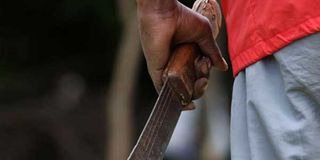
A new criminal gang calling itself ‘DNA’ is giving Eldoret residents sleepless nights in a wave of violent robberies and muggings.
Juma revealed that while the money was officially meant for mobilisation, “there is an unwritten rule that anyone who dares to speak against ‘the boss’ faces dire consequences.”
According to him, the decision to terrorise civilians is often made independently by the gangs because by the time the chaos begins, “the leaders are long gone.”
This chilling testimony sheds light on the dark underbelly of Kenyan politics. Many gangs operate in loosely formed “cells”, coordinated by powerful individuals who remain beyond the reach of the law.
A recent report by the National Crime Research Centre (NCRC) described how gangs are recruited and funded during election cycles.
“Criminal gangs are popular with some politicians who use them for personal gain, especially during electoral processes. Gang members are hired as goons to offer security or to intimidate political competitors,” the NCRC stated.
According to the report, Mombasa leads with 73 active criminal gangs, followed by Nairobi (56) and Kilifi (47).
The NCRC warned that political leaders must be held accountable for “directly and indirectly enabling gangs.”
Often, politicians intervene when gang members are arrested, emboldening them.
The intersection of politics and gang violence was on full display during recent presidential tours across Nairobi. Peaceful events devolved into chaos and beatings, often under the watch of law enforcement.
There were also dramatic moments during the launch of former Deputy President Rigathi Gachagua’s party, the Democracy for Citizens Party (DCP), when dozens of rowdy youth tried to storm DCP offices in Lavington, Nairobi.
It took gunfire fired into the air by Gachagua’s private security to disperse the mob. Journalists were also harassed and forced to delete videos by youth allied to the former Deputy President.
Interior Cabinet Secretary Kipchumba Murkomen said police were not officially informed. He added that money had changed hands and disputes over distribution sparked the chaos.
“Some of the supporters expected to be paid, and fighting over the funds caused chaos that led to a stampede,” he stated.
Similar dynamics played out during the Gen Z protests of 2024, when thousands took to the streets against the Finance Bill. Many turned up voluntarily, but not all. Money changed hands to mobilise and, in some cases, disrupt.
The protests forced the government to withdraw the Bill, but at a cost- dozens killed, hundreds injured or disappeared, and property destroyed.
President Ruto accused the US-based Ford Foundation of funding the chaos.
“I want to call out those who are behind the anarchy... Shame on them. Ford Foundation...how will the violence you’re sponsoring benefit you?” he asked during a July 2024 address.

Hired thugs, often organised into hierarchical 'cells' such as Nairobi's 'Dubai' or Kisumu's 'Sangwenya', are a pervasive force in Kenyan politics.
The claims were never substantiated. Ford Foundation denied involvement and has since patched things up with the Ruto administration.
But while most of those on the streets went there spontaneously for a cause, subsequent interviews revealed claims of youth from Mathare, Kayole, Kibera, Githurai, Kawangware and Makadara in Nairobi receiving payments.
By August 2024, the Directorate of Criminal Investigations (DCI) had recommended the prosecution of Embakasi Central MP Benjamin Mwangi and Embakasi North MP James Gakuya. They were accused of planning and financing violent protests.
Others named included former Embakasi West MP George Theuri, former Nyeri Town MP Ngunjiri Wambugu, and Gachagua’s aide Pius Munene.
In September 2024, High Court Judge Lawrence Mugambi issued an order blocking their arrest or prosecution pending a petition determination.
Activist Boniface Mwangi was also accused of facilitating the Gen Z protests. He denied the claims.
“We only designed and circulated posters. The protests were peaceful until goons were hired to create chaos. The government couldn’t stop the movement, so they infiltrated it,” he said.
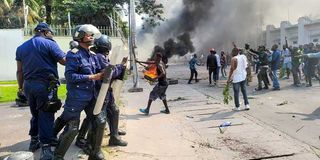
The number of gangs coming up to either protect or disrupt functions has been on the rise.
In Dandora, some youth were recruited not to protest, but to crush protests.
Moses Ogai, a local organiser, said motorcycle riders were paid Sh1,000 each plus fuel to ferry goons and disrupt Gen Z crowds.
“They were given instructions to use violence and bring the protests to an end,” he said.
Among those named for allegedly facilitating operations was a nominated MCA. He denied involvement.
The same script also applies beyond Nairobi. What began as politicians hiring youth as bodyguards during general elections has now morphed into a menacing force across Western Kenya, especially in Kisumu, where organised gangs known as Sangwenya are increasingly dictating the terms of public engagement.
They are a structured force, ruthless in method and loyal only to money. Whether at political rallies, funerals or community events, their presence has become synonymous with violence.
“We’ve witnessed them assault leaders. Just recently, an MCA from Kisumu Central was attacked during a function after declaring interest in a higher seat,” said Gabriel Otieno, a resident of Kisumu.
According to Muite Okew, chair of the Kisumu Peace Committee, the roots of Sangwenya date back to the 2022 pre-election period, when politicians began recruiting youth to spread propaganda, intimidate rivals and act as informal bodyguards. Once the elections were over, the youth were abandoned.
Desperate, they reorganised into gangs with leadership structures and returned to the same politicians, offering protection for a fee.
The tactics evolved too, now including threats, online trolling and physical violence. Even women are involved, with groups such as ‘Warembo na…’ performing praise songs at events in exchange for money.
“These turf wars have become battlegrounds to show strength and win political favour,” Okew said.
During President William Ruto’s recent visit to Kisumu, the gangs reportedly stole valuables. Aspiring MCA Sospeter Obungu Awich claimed that hired goons, allegedly sent by a rival, demolished a boda boda shade he had built for local operators.
“We’re losing the plot. Youths must stop being pawns in selfish political games,” he warned.
In Homa Bay, the scene is equally grim. Here, young men are hired as bodyguards who double up as political enforcers. Wearing uniforms resembling those of the National Youth Service to appear official, they attend rallies and funeral ceremonies ready to intimidate or clash with rival groups. The risks are enormous.
In May 2024, Evance Okoda, a renowned political bodyguard, was killed while protecting Kasipul parliamentary hopeful Philip Aroko. Okoda had previously worked with notable politicians like Evans Kidero and Silvance Osele. His death cast a harsh light on the cost of political loyalty in Kenya’s shadowy underworld of hired muscle.
“These leaders don't tolerate opposing views. They rely on fear to win votes…If you have to bring thugs to a rally, then you're not ready for leadership,” said Michael Kojo, Executive Director of Asego Public Litigation Forum.

Hired thugs, often organised into hierarchical 'cells' such as Nairobi's 'Dubai' or Kisumu's 'Sangwenya', are a pervasive force in Kenyan politics.
The problem has become more insidious with the introduction of teargas into civilian hands. On April 9, 2025, police arrested a man in Nyakach, Kisumu County, en route to sabotage an ODM election armed with a teargas canister and crude weapons.
That same day, another stash was discovered in a vehicle in Siaya County. Bondo Police Commander Robert Aboki said investigations were underway, but whistle-blowers, including a serving officer, allege rogue police sell unused canisters for quick cash.
“If you’ve been assigned 10 canisters and return only two, no one asks questions,” said the officer, who spoke on condition of anonymity.
Kevin Omondi, 31, from Alego-Usonga, knows the cost of this business.
In December 2022, he was hired for security during a tense by-election. En route to a polling station, his group was ambushed by rivals. The vehicle rolled and he suffered a fractured leg, spending three months in hospital.
“With limited job opportunities, many youths see this as quick money. We’re hired either to protect or to disrupt, whatever serves the politician’s interests,” he said.
He explained the hierarchy, junior goons earn around Sh500 per day while the higher ranks make Sh800 to Sh1,500 and handle operations, including recruitment.
Vincent Onyango, 27, who has worked as a political goon for three years, revealed that one is hired with specific instructions.
“Sometimes our job is to prevent a rival from attending a funeral. If we hear another group has been hired, we’re called in too. That’s how chaos erupts,” he said.
Both Omondi and Onyango agree that the root cause is poverty and neglect.
“We’re being used as pawns. Until there are real jobs and leaders who genuinely care, this cycle won’t end,” Omondi said.

